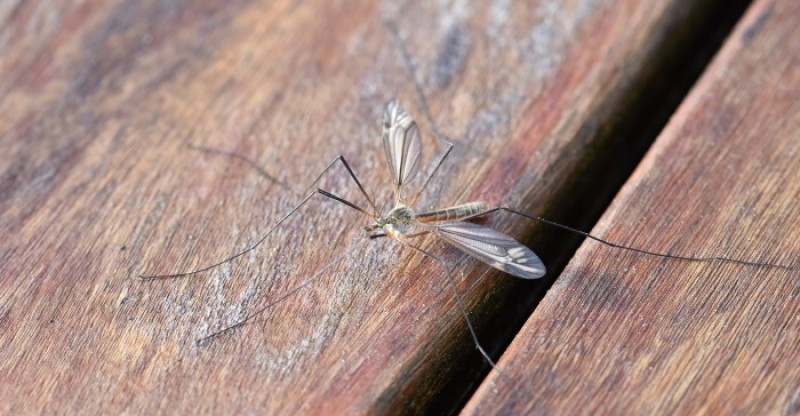20 Science-Backed Remedies to Get Rid of Mosquitoes
Sometimes it seems like there are hundreds of mosquitoes on the front lawn or under the trees on human properties.
How can you get rid of them? What are the best ways to prevent them in the first place?
This article covers over a dozen of the most effective home remedies for mosquitoes that you can start using today to cut down on their population and regain control of your property.
At department and home improvement stores, you can find a lot of products that are overflowing with chemicals that claim to rid you of this noxious pest.
Some of them work and some of them don’t.
The ones that DO work the best must be re-applied every few weeks.
This gets to be expensive as well as frustrating; you’ve gotten rid of mosquitoes, and now your yard or tree box is full of harmful chemicals that can damage the soil and everything in it.
It’s also quite worrisome if you happen to get these chemicals on your skin – it can even be itchy and cause an allergic reaction!
So, what’s the point of using them in the first place?
Learning how to keep mosquitoes away can seem like such a chore.
You don’t have to apply expensive, chemical-laden mosquito repellents or killers.
We’ve gathered the most effective and non-toxic home remedies for you to try.
Not everything will work for everyone, but once you find the best solution for yourself, make sure to let your family and friends know!
It’s not fair to keep these mosquito-repelling secrets to yourself.
What are Mosquitoes?
“Ouch!” That’s the first thing most of us say when we’re bitten by a large mosquito.
Then the itching starts, and if you’re like me, it itches like crazy for days on end.
You can feel powerless to control a large mosquito population, but that’s far from the truth.
As humans, we have the power to control and minimize the number of these pests on our properties.
The name mosquito comes from a Spanish word that translates to “little fly.”
Although many people mistakenly believe mosquitoes only eat blood, the truth is that they mostly feed on plant nectar for their normal life cycle.
Male mosquitoes actually don’t bite humans at all, but females ingest blood as a sort of vitamin.
They drink it to help their eggs become strong before they lay more of them.
In this way, mosquitoes are the opposite of man’s best friend.
As thinking humans, we often wonder what they’re good for.
In countries and regions with mild climates, people are only afflicted with this pest for a few months a year.
However, in other climes, they’re year-round visitors, and getting rid of them for a few brief moments can help prevent their annoyance for a little while.
Learning how to get rid of mosquitoes is an essential part of survival in places where they’re out and about all the time.
There are more than 3,500 species of mosquitoes on our planet, and in the United States, there are about 175 species.
The most prominent are Anopheles Quadri maculates, Culex pipiens, Aedes aegypti, and the Aedes albopictus, aka the Asian tiger mosquito.
Potential Problems that Mosquitoes Can Cause
Unlike many other insects, we can feel the mosquito when it bites us.
In humans, a mosquito bite will then cause intense itching and usually a lump at the site for a few days.
It’s not fun, but it’s a normal part of life.
However, that’s just the tip of the iceberg when it comes to the troubles a mosquito infestation can cause.
Some people suffer more than a lump at the site of their mosquito bite.
Humans – and pets, too – can have severe allergic reactions to those bites.
This may mean a lump that swells to the size of a golf ball or even life-threatening emergencies such as an asthma attack or anaphylactic shock.
Children with a lot of allergies, especially asthmatic reactions, should always be closely observed after any bug bite.
A bug bite can turn deadly within just 15 minutes of first exposure.
Aside from allergic reactions, some people may scratch so much that they bleed and cause a skin infection such as staph.
People with compromised immune systems and diseases like diabetes should be very careful with mosquito bites, and use antibiotic ointment if they scratch and bleed.
(An antihistamine can also rid you of the itching.)
Other problems that mosquitoes can cause are the spread of various diseases.
According to the American Mosquito Control Association, over one million people die from the mosquito-related disease every year.
Humans, especially in North America, can acquire a variety of illnesses from mosquitoes.
Most recently, in summer of 2017, three people in California died from West Nile virus, which currently is only known to be transferred via mosquito bite.
The Zika virus, transmitted by mosquitoes, has become more prominent in recent years after flourishing in Brazil.
Many babies have been born with micro encephalitis in Brazil, while elderly, frail and sometimes even healthy people have suffered from the aftereffects including some types of nerve damage.
There is still a very grave threat to human life associated with Zika, and it has been detected in over a dozen countries since it first became a worry at the 2016 Olympics.
Because the virus was once rare and contained to more rural areas, scientists are still studying the damage it does to the body, which seems to long outlast the presence of the virus.
Yellow fever, dengue fever, and encephalitis can all be transmitted by mosquitoes.
Mosquitoes cause more suffering and death than any other living creature, and their devastation doesn’t only affect humans.
Dogs can get heartworm from mosquitoes, and horses are in danger of acquiring Eastern equine encephalitis (EEE) from them, although EEE has also been shown to be able to attack other species.
Mosquito-borne illnesses are no joke, but doing your best to minimize the mosquito population on your own property can prevent them.
Take preventative measures to avoid bites when you can’t control how many mosquitoes choose to attend your outdoor gatherings.
These natural remedies we’ve put together should help you avoid mosquitoes and prevent their bites, no matter where you live.
Learning how to get rid of mosquitoes will help you have a much better life this summer, as well as next!
When learning how to repel mosquitoes, be prepared to test a few remedies – remember that there are hundreds of different mosquito types in North America alone, and each genus may react a little differently to each method.
So try some options, and when you find a few that work, use them together for maximum benefit.
Home Remedies for Mosquitoes
Lavender Mosquito Repellent
This DIY solution takes just a little bit of preparation but will last you all mosquito season.
Lavender is a well-known mosquito repellent, but this recipe takes it a step further than saying “just rub it all over your body.”
This is a great solution for people who are sensitive to chemicals, and for children as well.
The smell of lavender oil can keep away mosquitoes as effectively as any solution you buy on the market.
Spray this solution on your skin or in a room where you’ve seen any mosquitoes (1).
You will need lavender essential oil, distilled water, lemon juice and lemon extract, as well as a clean, never-used 8-ounce spray bottle.
(You can get them for a buck or two at a department store in either the cleaning supplies section or the gardening supplies.)
Mix ¼ teaspoon of lavender with ¾ of a tablespoon lemon extract and another ¾ tablespoon of lemon juice.
Fill the rest of the bottle with water, and give it a shake for 15 seconds.
Test a sample of it on your skin if you plan to use it as a personal repellent, to make sure you’re not allergic to the lavender.
Lavender Plants
If you live in an area that has mosquitoes year-round, or you like to just open your windows a lot, it’s worth the trouble to seek out lavender in its natural form.
It’s not feasible to fill a large home with plants, but in a small home or apartment with windows, you can really make a difference if you keep them near the windowsill.
The great news is that it’s pretty easy to grow lavender.
Lavender plants have a lovely flower that they display when in full bloom. They also smell fantastic!
You can grow them in every room in the house, and you can even make an oil or potpourri from them as well to use in places around the house where you want to repel mosquitoes (2).
Basil Mosquito Repellant
Mosquitoes are also known to be repelled by the smell of basil, but the scent needs to be strong.
You can use this repellant around the house, or outdoors around the perimeter of your house or deck (3).
Use fresh basil – you can buy bunches at your local grocery or organic food store.
You’ll need one cup of it, chopped up. Then you will need a half-cup of water, and a half-cup of vodka.
Finally, you’ll also need an 8oz bottle purchased from a home improvement store or a department store.
Put the chopped up leaves in a glass bowl.
Boil the water and pour it over the leaves. Leave them to steep for about 3 hours.
Filter the leaves from the water and squeeze them to get any remaining residue.
Use a funnel to pour this liquid into the bottle, and then top off the liquid with vodka.
Use water to fill the bottle up to the fill line.
Humans can use this on their body, too, in a pinch. Just remember, it smells like basil AND vodka.
Dry Ice Distraction
This isn’t something you can probably afford to do every day, but dry ice is incredibly effective in attracting – and then distracting – mosquitoes.
Use it when you have an outdoors event and place it a yard away from where your actual guests will be sitting.
If you’re using it indoors with the windows open, use it to make sure that mosquitoes don’t get past the windows.
Why does this work?
You see, dry ice emits a large amount of carbon dioxide, attracting mosquitoes to that area and keeping them confused and away from the humans (4).
Eradicate with Coffee Grounds
This is a very important way to keep mosquitoes from reproducing.
Even if you’re using sprays or other methods, this can be the most effective way if you want to know how to keep mosquitoes away from your property.
If they don’t live there, then they can’t bother you!
Mosquitoes reproduce in water, and it’s usually stagnant water that’s gathering around your home in puddles or other objects.
If you can’t eliminate the water, you can use it to your advantage to stop the breeding.
A study has proven that coffee grounds kill mosquito larvae but it’s not by anything poisonous to humans.
Coffee is brownish in color, which attracts mosquitoes because it resembles leaf infusion, reminding them of their mating environment.
The coffee grounds have chemical byproducts that force the mosquito eggs to come to the surface of the water, where they are then deprived of oxygen.
This will kill the eggs off before they hatch.
Get rid of your used grounds regularly – about once a month, to stop them in their tracks (5).
Take Garlic
Garlic is known to have both antibiotic and anti-larval properties.
Depending on your tolerance to the smell, you can use it in a variety of ways.
The easiest way to use it is on your skin.
For example, you can wrap minced garlic in a washcloth, wet it with water just a bit, and rub it on the exposed parts of your skin.
Or you can take daily garlic supplements to ward off mosquitoes.
They’re known to lower blood pressure and fight infections, too (6).
Use Garlic as a Repellant
Crush 3-4 cloves of garlic, and drop them into about 2 cups of boiling water.
Turn it down to a simmer after 5 minutes, and put the lid on the pot. Leave it for 20 minutes.
Remove it from the heat and let it sit until cool. Once it’s cooled, use a funnel to pour it into an 8 oz. spray bottle.
Spray the perimeter of your outdoor patio before cookouts, and the perimeter of your front and back doors to keep mosquitoes outside (7).
Homemade Bug Spray for Humans
This is a homemade bug spray not only good for repelling mosquitoes, but also for warding off other bugs, as well.
You’ll need witch hazel, apple cider vinegar, and an essential oil – your choice from the following: eucalyptus, lemongrass, citronella, tea tree, or rosemary.
Pour ½ cup of the witch hazel, ½ cup of the apple cider, and 40 essential oil drops from the oil of your choice with a funnel into an 8 oz. spray bottle.
Put the nozzle top back on, and shake. That’s it. Spray it liberally on exposed skin.
It’s a great solution for kids who may be sensitive to chemicals or perfumes (8).
Bleach as Insecticide Preventative
This solution is best for high-up water puddles such as those that gather on your rooftop or on top of your porch, deck, etc.
Nobody likes to work with bleach, but it’s a good natural remedy that will kill mosquito eggs before they can mature.
Use bleach with 5.25% sodium hypochlorite, and be careful as you handle it.
Unfortunately, the same bleach that can kill mosquito larvae, bacteria, and fungi can also be harmful to pets and wildlife.
NEVER add bleach to a natural pond or stream, and NEVER add it to any water sources you know are used by animals, too.
Spray places that gather water with a 1-to-1 solution of bleach and water around once a week to make it an inhospitable place for mosquitoes to breed.
You only need – at the very most – around a tablespoon per gallon (9).
Cinnamon Oil as Insecticide Preventative
Cinnamon, in studies, has been shown to be incredibly easy and effective to use on puddles that hold mosquito eggs.
Eradication has taken place in as little as six hours after application.
All you need is some cinnamon oil to stop mosquito populations in their tracks.
Use about one teaspoon.
To get the oil, you will probably need to go to a health food store, but some perfume and oil stores in urban settings may sell it, too.
If nothing else, you can always make it on your own – it will save you a LOT of money if you learn how to do this.
Using cinnamon to keep mosquitoes away is easy ! (10)
Camphor to Drive Mosquitoes Out of Your Home
If you’re running into mosquitoes inside, camphor is another home remedy to get rid of mosquitoes in an environmentally-friendly manner.
While some people recommend burning camphor, it turns out that you don’t need to do that.
You can buy it in tablets and place them in a bowl of water all day.
The water attracts mosquitoes, and when they try to lay eggs or drink it, they will be poisoned and seek a safe place to die.
This will make it seem as if they have disappeared (11).
Camphor and Neem as Personal Mosquito Repellant
For this natural remedy, you need 4 camphor balls, 1 cup Neem oil (find it at health food stores or on Amazon), and an 8 oz., unused empty spray bottle.
Fill the bottle with the given ingredients and top it off with water.
Shake vigorously and spray onto exposed skin before you venture outdoors.
If you desire, you can also add a few drops of citronella to the spray.
Before bed, spray pumps of this solution onto a bath towel and attach it to the bed to repel indoor mosquitoes.
Combined with a net, this makes for a great way to prevent bites after bedtime (12).
Citronella as a Repellant
Citronella candles and oil-candles are an excellent way to repel many types of insects, and they smell pleasant, too.
If you’re looking for a quick body spray to repel mosquitoes, take a half-teaspoon of citronella and combine it with water in an 8 oz. spray bottle.
Use sprigs of eucalyptus or eucalyptus oil to add a boost to the mosquito-repelling property.
Many people swear by citronella, and there are literally dozens of products on the market that feature this ingredient.
Candles do well both indoors and out, and as long as you enjoy the smell, there’s no reason to be sparing with this ingredient – it’s cheap, safe and effective (13).
Homemade Yard Spray
While the ingredients in this yard spray are not entirely natural, they’re nontoxic and they’re easily available, especially the beer!
This spray has been used by savvy Americans for decades to repel mosquitoes.
You will need a few beers, mint mouthwash, and Epsom salt.
You will also need a professional-quality, unused spray bottle with a hose to pour it into.
The recipe is incredibly simple: take 3 bottles of beer, 3 cups of Epsom salt, and one bottle of blue color mouthwash, and spray the perimeter of the yard and the house.
Do this about once every 3 weeks to stay mosquito-free, and make sure to make use of some citronella candles, as well (14).
Tea Tree Oil with Lotion
You can buy this oil at almost any drug store or natural health store, and it’s great not only for repelling bugs, but also preventing and curing skin infections such as staph, acne, etc.
Just mix a few dots of this potent oil with your favorite lotion and apply to arms, legs, and hands to repel mosquitoes from biting you.
Use this oil (just a few drops) in other homemade, natural preparations to provide a boost to sprays that you will use around the perimeter of your home, around entryways, etc.
If you’re looking to learn how to repel mosquitoes, tea tree is one of the strongest concoctions around.
Grow Mint
Mint is one of the most fabulous ways to repel mosquitoes – it smells great, and is incredibly refreshing as aromatherapy.
Use mint as a plant in your garden to keep mosquitoes away, or indoors as a plant near windows.
(When you’re not keeping mosquitoes away, you can also add a sprig to sparkling water or cocktails.)
Combine mint, lavender, and basil for a wonderful mosquito-repellant outdoor garden, keeping them many feet from your property (16).
Mint Oil
Mint oil can also be extracted from your homegrown mint plants, or you can also purchase it at your natural food stores or aromatherapy/oil stands at the mall.
Alternatively, grocery stores sell mint extract as well in their cake and baking sections, near the vanilla extract.
Add a little lemon with a teaspoon of mint to an empty, 8 oz. spray bottle.
Top off the bottle with water, and give it a good shake.
Apply to skin or spray in problem areas outdoors.
You can also add a teaspoon of mint to standing water to deter them from reproducing (17).
Red Cedar Mulch
This is a great way to make your garden mosquito-free.
Red cedar mulch is very fragrant and will deter mosquitoes after rainfall.
For a spray, boil about a cup of red cedar chips in a small pan and let sit until the water cools.
Fish out the wood chips and let it sit again for a few minutes.
Then, grab an empty, unused 8 oz. spray bottle and pour the contents into it.
Shake hard, and you will have a great spray for the outside of doors and the perimeter of your yard (18).
Clove Oil to Kill Mosquitoes
Clove oil is great for adding to your other mixtures that are used as a spray – but DO NOT use them on your skin, as it has chemicals that can possibly burn.
Instead, use about a half-teaspoon in standing water and keep a spray for directly spraying the little buggers.
Clove oil smells pleasant, and if you like, also add it to a bowl of water in problem spots; just make sure no animals can drink out of it (19).
Apple Cider Vinegar
When learning how to keep mosquitoes away, sometimes less is more.
Drink a quarter cup of this vinegar with apple juice, and add a teaspoon of honey to sweeten it to taste.
Do this about a half hour before you go outside.
This is a great solution for fussy kids who are allergic to everything.
You can also mix several drops of it into lotion, and apply liberally.
The smell is quite pleasant, and there aren’t any known bad reactions to it.
Do’s and Don’ts
These home remedies for mosquitoes are great when learning how to keep mosquitoes away and should help you truly keep your mosquito bites at bay and the population to a minimum.
However, there are definitely some do’s and don’ts when it comes to mosquito control.
Of course, we want you to know them!
Who wants to injure themselves or totally negate the fruits of their labor? Absolutely nobody, that’s who.
So make sure you pay attention to the following information!
Do’s when Ridding Yourself of Mosquitoes
- DO hang a mosquito net. This means if you’re sleeping with the window open or simply lounging on your porch or deck. They’re super cheap, they’re effective, and they’ve been used in some of the most mosquito-ridden areas in the world to help minimize the misery of mosquito bites.
- DO keep windows and doors closed, if possible.
- DO keep an eye on your windows if you keep them open. If you don’t have AC, make sure that you inspect your screens regularly for holes and gaps. You can patch them with a cheap kit from a hardware store, or find one on Amazon.
- DO kill mosquitoes when you see them. It’s easier that way, and you will keep at least one mosquito from biting you again.
- DO try to eliminate sources of light that attract mosquitoes, especially at night. Retailers, especially places that sell yard supplies and home improvement supplies, will offer mosquito-repellent lights. For example, you can use sodium lamps, yellow bug lights, or LED lights both inside and outside your home. (Make sure you check that these lights are approved for indoor or outdoor use.
Don’t when Getting Rid of Mosquitoes
- DON’T let open water sources sit around your home, indoors or outdoors. Don’t let water sit in dishes in the sink overnight, and don’t let it accumulate in objects outside your home. Do a sweep of your property outdoors to see what holds water, and turn any items on their side to keep them from accumulating water when it rains. If water is accumulating in puddles in your dirt, fill up holes on a sunny day. Water that accumulates on concrete will require having work done to keep the concrete level.
- DON’T ever use chemicals that you’ve bought on the internet without reading reviews and making sure they’re safe and legal to use.
- DON’T spray any repellant without making sure you are not allergic to it. Test it on a swatch of skin near your wrist and wait half an hour to see if any allergic reaction develops.
- DON’T ever spray ANY kind of repellant on your face, even if it is organic or natural. Spray it on your hands first, and then apply.
Conclusion
When learning how to repel mosquitoes, there are plenty of remedies to try.
Don’t give up just because one of the things you’ve tried seems to give lackluster results – keep trying.
So many of these remedies have worked wonders for many people; it just sometimes means that your mileage may vary depending on the mosquito type, your region, and even the climate.
Coffee grounds will wash away in inclement weather, for example, but a bowl of water in your home filled with mosquito-repelling concoctions should keep them at bay indoors.
Personal preference will also have a lot to do with which remedy works best for you.
How to keep mosquitoes away is an ongoing battle.
Some people don’t like the smell of neem or lavender, so they may want to try alternatives first.
Don’t give up!
The war on mosquitoes is ongoing, but you can win it if you pay attention to what’s going on, monitor your results, and use repellents for both your skin as well as your yard and home.
Learning how to keep mosquitoes away will make your summers and outdoor times much more pleasant.
FDA Compliance
The information on this website has not been evaluated by the Food & Drug Administration or any other medical body. We do not aim to diagnose, treat, cure or prevent any illness or disease. Information is shared for educational purposes only. You must consult your doctor before acting on any content on this website, especially if you are pregnant, nursing, taking medication, or have a medical condition.
HOW WOULD YOU RATE THIS ARTICLE?






